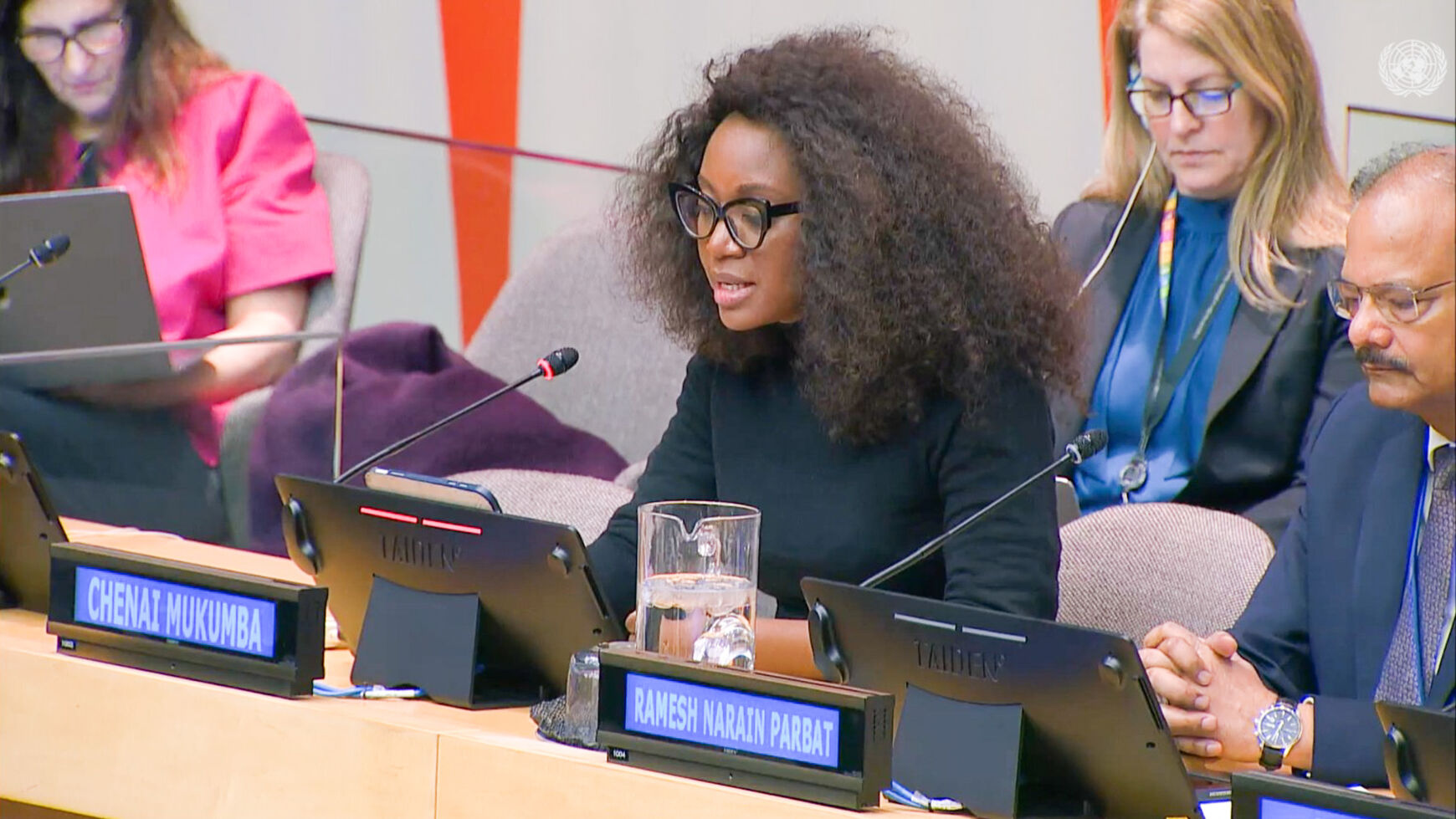Date

As African countries struggle with limited external financing and a rising debt burden, there is an urgent need to enhance domestic resource mobilisation (DRM) to achieve self-reliance, equity, and sustainability.
Tax Justice Network Africa (TJNA) Executive Director Chenai Mukumba stressed this while speaking at the high-level discussion Panel one segment on “challenges and opportunities to strengthen domestic resource mobilisation” where she unpacked the barriers of DRM in Africa and proposed innovative solutions to strengthen DRM at the 2025 ECOSOC Special Meeting on International Cooperation in Tax Matters, on 28 March at the United Nations headquarters in New York.
Ms. Mukumba opened her remarks by highlighting the strategic importance of DRM to Africa’s development agenda.
“Africa’s Agenda 2063, the continent’s strategic development blueprint, envisions that between 75% and 90% of its implementation will be financed through domestic resources. This clearly reflects the continent’s aspiration to become self-reliant and fund its development from within,” she said.
However, she cautioned that these aspirations are unfolding in a complex economic environment characterised by declining external financing, including reductions in official development assistance, foreign direct investment, remittances, and soaring public debt levels.
“We are witnessing a medium public debt ratio of 63.5% between 2021 and 2023 across the continent and a low median tax-to-GDP ratio of around 14%. These figures illustrate the urgent need to strengthen domestic revenue collection,” she noted.
Ms. Mukumba identified three core challenges hindering progress toward effective DRM in Africa: illicit financial flow (IFFs), regressive tax regimes, and public discontent and exclusion in global tax governance.
She highlighted that an estimated USD 88.6 billion is lost annually through IFFs, noting that these resources are crucial for public service delivery in areas such as health, education, and infrastructure.
“These funds are largely lost due to the aggressive tax avoidance practices of multinational corporations, facilitated by transfer pricing abuses, exploitative tax treaties, and the use of secrecy jurisdictions. This significantly erodes the continent’s tax base,” she stated.
The loss of vital revenues has forced many African governments to rely on regressive tax measures, disproportionately burdening low-income populations.
“We are seeing growing public resistance, particularly in countries like Kenya, where increased consumption taxes are driving social unrest. Meanwhile, large corporations and high-net-worth individuals remain undertaxed. This is neither just nor sustainable,” Ms. Mukumba stressed.
The last point she raised addressed Africa’s exclusion from global tax governance. She criticised the current international tax framework for being fragmented and dominated by a few exclusive decision-making bodies.
“The current system restricts the ability of developing countries to influence global tax standards, perpetuating historical imbalances and impeding inclusive reform,” she observed.
Despite the challenges, Ms. Mukumba offered a hopeful outlook, outlining three key opportunities to advance DRM and build a fairer international tax architecture. Ms. Mukumba firmly urged the United Nations (UN) to take centre stage in global tax rulemaking.
“The forthcoming UN Framework Convention on International Tax Cooperation, expected in 2027, presents a transformative opportunity to create a more inclusive and multilateral tax system. We must support its adoption and ensure it reflects the voices of developing countries,” she urged.
She emphasised the need for reforms that reflect where economic activities actually take place.
“Africa must claim its fair share by redesigning tax treaties that currently enable excessive revenue losses and by pushing for a more just allocation of profits,” she said.
Ms. Mukumba called for urgent action to address the digitalisation of economies, which has outpaced current tax rules.
“The first protocol under the UN Framework Convention must create an equitable path for taxing digital services. This is a frontier Africa cannot afford to ignore,” she noted.
In closing, Ms. Mukumba issued two key calls to the international community: “Firstly, we need more member states to support the adoption of a binding UN Tax Convention to establish a fairer international tax system that works for all, not just a privileged few. Secondly, as we approach the Fourth International Conference on Financing for Development (FfD4), we must ensure that its outcome document strongly supports the progress being made under the UN Framework on International Tax Cooperation.”
Mukumba’s intervention reaffirmed TJNA’s long standing commitment to equitable tax systems and highlighted Africa’s proactive role in shaping a just global tax order one that puts people, equity, and sustainable development at the centre.
For more information on the 2025 ECOSOC Special Meeting on International Tax Matters, please contact Everlyn Muendo at emuendo[@]taxjusticeafrica.net.